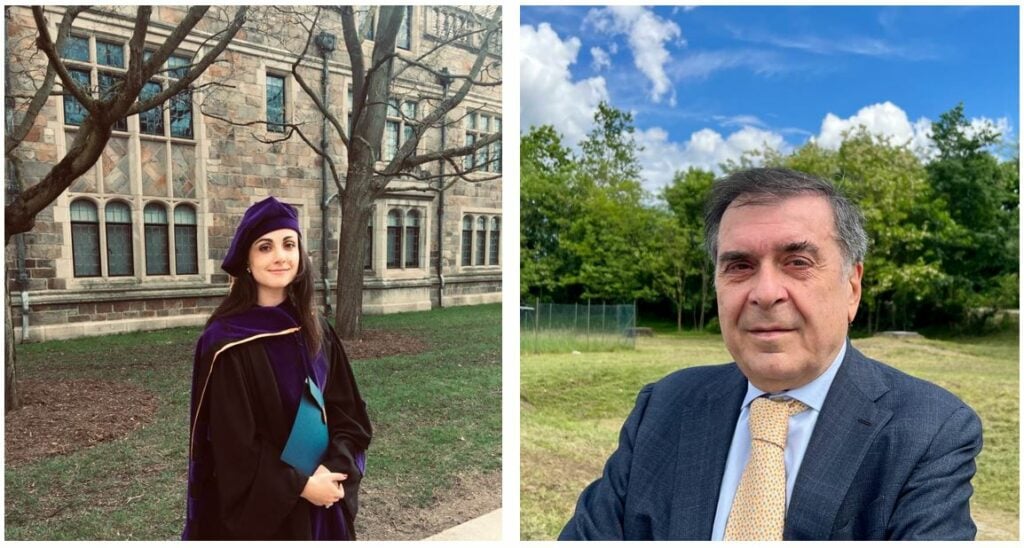
This year marks the 75th anniversary of the Fulbright Commission Italy.
During the Annual Meeting in June, the 6 Fulbrighters -who have won the Fulbright 75th Anniversary award- will be awarded.
On this occasion, we interviewed them to better understand who they are and what they do. This time we interviewd prof. Palazzo and prof. Ferrari.
Introduce yourself: what do you currently do?
Palazzo:
I am an Assistant Professor in Constitutional Law at NOVA School of Law, Lisbon and a Visiting Professor at Reichman University (IDC Herzliya). I am currently working in the area of family law, and constitutional law to explore the topic of the legal recognition of non-traditional families, including families of friends and relatives. I am coordinating a Jean Monnet Module on EU Family Law funded by the European Commission at NOVA School of Law, Lisbon, Portugal.
Ferrari:
I am an Emeritus Professor at Bocconi University, where I have held the post of full professor of Constitutional law from 2016 to 2020, and the post of full professor in Comparative Law since 1999. Formely, I was Full Professor of Comparative Law at the University of Teramo (since 1986 till 1990) and Pavia (1990-1999). From 2014 to October 2022, I held the post of Vice-President of the International Academy of Comparative Law. I am furthermore the founder and Director of the law reviews “Diritto Pubblico Comparato ed Europeo” (Public and European Comparative Law) and “Dpce online” and President of the Dpce Association since 1999 to 2016. I have written and edited several volumes and about 350 articles, concerning public law, constitutional law, comparative law, environmental and urban law.
At what point in your academic and professional career did you decide to apply for a Fulbright grant to Italy and why?
Palazzo:
I was completing my PhD on the legal recognition of non-traditional families in the US, Canada and Europe and realized that some fieldwork in the US would have been a valuable and worthwhile endeavor to complete the chapter on the US legal framework. I was right: it has been an inestimable experience.
Ferrari:
It was 1976-77, I did not have tenure yet. I decided to go to Virginia in 1980 because I was conducting research on American constitutional law to write a book, which got published in 1984.
When you recall your stay in the US? What is the first image that comes up to your mind?
Palazzo:
The large piano in the cottage of a beautiful 90-year-old woman with whom I was leaving, and the fairy-tale premises of the Michigan School of Law and of its library.
Ferrari:
The campus and green loan of the University of Virginia.
Could you tell us more about the project that has been awarded for the 75th Fulbright Italy Anniversary?
We created a Permanent Forum on the US Democracy, which is a permanent forum of discussion that meets every other year and, hence, continues to meet throughout different US Presidencies.
The project is designed as a transatlantic conversation between Italian scholars working on US constitutional law and invited US experts in constitutional law. We thought that the forum could promote an improved understanding of the state of health of US democracy. Each session consists of two parts: First, there is a conference where experts meet to discuss the assigned topic. The conference is then followed by an edited collection or a special issue published on a peer-reviewed journal, where participants explore a specific subject that is relevant to assessing the democratic outlook of the US Presidency.
The intended goal of the project is to foster an informed academic conversation over the democratic outlook of the American Presidency. The methodology is comparative in the sense that the conviction is that studying US democracy through the lens of foreign scholars will yield a positive impact on US law by improving the self-understanding of constitutional doctrines (so-called reflexive value of comparative law). A second goal consists of promoting good governance policies. Through its comparative methodologies the project highlights different legal solutions to tackle problems of constitutional relevance. A final goal consists of promoting transatlantic conversations between Italian and US academia.
